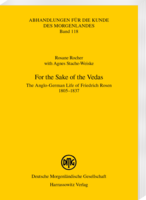|
Download:
Bitte beachten Sie: Mit digitalen Produkten in Ihrem Warenkorb
wird die Bezahlung nur per PayPal möglich. Der Download dieser Produkte wird bereitgestellt, wenn die Bezahlung bestätigt ist. “If it were not for the Vedas, the university alone would not keep me in London… I like to compare myself to an Indian muni, who forsakes other concerns for a while to read the Vedas in peace and attain Indra’s heaven, which in my case might be some German university.” Friedrich Rosen thus wrote his teacher Bopp in 1830. Drawing primarily from a vast correspondence, most of it unpublished, this biography documents and analyzes his resolve and its impact on the rise of European Indology. The works of this first PhD in Sanskrit at a German university and first professor of Sanskrit at a British university include the first edition and translation of the first book of the Rigveda, with notes incomplete at his untimely death, and the first edition and translation of the oldest Arabic treatise on algebra. Yet more momentous was the help Rosen gave to continental scholars from Humboldt, Schlegel, and Burnouf to beginners, with sources uniquely accessible in England. He also exercised his influence on the Oriental Translation Fund to publish their works as models of critical and comparative scholarship. His mentor Humboldt acknowledged “I can only deeply regret that we … must be deprived of your presence. Yet, it is definitely of greater benefit for you, and even more for scholarship, that you remain so many years close to the sources of the works to which you are devoting yourself.”
|
|||||||||||||||||||||||||||||||||||||||






